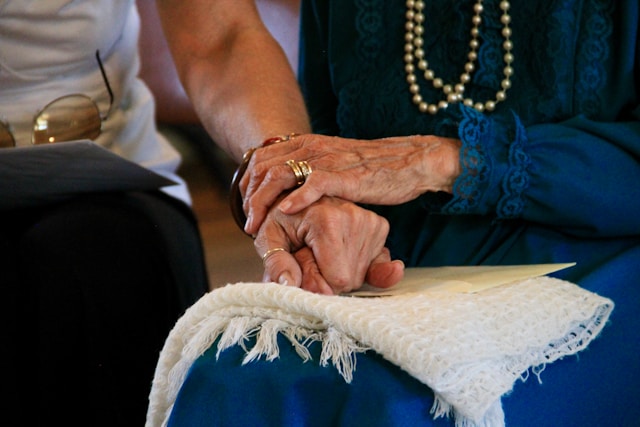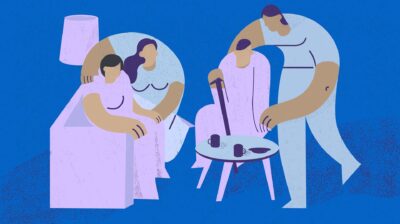What is young carers stress?
Learn more about the impact of caring and why you might be feeling stressed.

Being a young carer or young adult carer can be rewarding. It often involves helping someone close to you meet their basic needs or participate in activities they might not otherwise be able to do. Many young carers take pride in their role because they gain valuable life skills and perspectives that others at their life stage may not have. However, research shows that caregiving can also bring significant challenges, including young carers stress.
In this article, you’ll learn more about the many reasons why you might be feeling overwhelmed or stressed as a young (adult) carer, including:
Feeling like you’re not meeting the “ideal” carer standard
Balancing caregiving with other aspects of life
Worries about the future
Experiencing hidden losses and “disenfranchised grief”
Although not covered in detail here, another common and equally impactful source of stress is financial strain. You can find more information about state financial support, such as Carer’s Allowance, in our dedicated article on the topic.
Am I a young carer?
Many people do not realise that they are young carers (under the age of 18) or young adult carers (aged 18-24) when they are providing care to people close to them. Identifying yourself as a young carer can help you:
- Make sense of any stress or emotional distress you may be experiencing
- Access specific supports available for young carers
Find out if you are a young carer or young adult carer.
What is the mental health impact of being a young carer?
Research shows that carers experience higher levels of stress compared to people without caregiving responsibilities. Key findings from the YOUNGCARERS research project (2022–2023) highlight the impact.
Among 83 young carers under the age of 18:
- 80 per cent were at risk of depression
- 86 per cent felt stressed
Among 48 young adult carers aged 18–24:
- 64% were at risk of depression
- 98% felt stressed
The YOUNGCARERS research project (2022-2023), led by Family Carers Ireland, University College Cork (UCC), the University of Limerick (UL) and the Irish Second-Level Students’ Union (ISSU), aimed to gather new insights into the experiences and support needs of young carers and young adult carers in Ireland. You can access more key findings from the research in the Sharing the Caring report, available from Family Carers Ireland.
What is young carers stress?
Everyone experiences stress from time to time. In the short term, higher levels of stress in response to potentially risky or dangerous situations can even be helpful. However, chronic stress—whether caused by a major life event or, more commonly, the build-up of multiple everyday stressors—can take a toll on your physical, emotional, and mental well-being.
You’re not to blame for young carers stress
While there are ways you can change your thinking and behaviours to feel better, it’s important to remember that, as a young (adult) carer, it is not your responsibility to find a “solution” on your own. There are no quick fixes for the complex stresses of family caregiving, especially when many of these stressors come from:
- Societal and economic factors, such as a lack of adequate services, support, and income for young carers and their families
- The challenge of balancing multiple roles and social expectations, like being a student, employee, friend, and young carer
- Difficulties using the healthcare system, from accessing an early diagnosis to receiving appropriate medical and emotional support
Common causes of young carers stress
Below are some common reasons why young carers and young adult carers might experience higher levels of stress. To find information on practical ways to respond to these stressors, take a look at our article on managing stress as a young (adult) carer.
Not “living up to” the carer ideal
As a young carer or young adult carer, you may feel the weight of society’s expectations about what caregiving should look like. Society often portrays family carers as selfless or inspirational, and it’s easy to believe these messages without realising it. You may be holding yourself to unrealistic standards about what kind of relationship you should have with the person you’re caring for and how you should feel about this relationship.
It’s normal to have a complex relationship with the person you’re caring for. While you might feel emotionally close, you may also sometimes resent the everyday demands of caregiving, which can impact other important areas of your life. If caregiving brings up difficult emotions, like anger or resentment, you might feel guilty or like you’ve “failed” to live up to certain ideas of what a “good” or “inspirational” carer should do or feel.
Balancing caring with other life responsibilities
Many young carers juggle caregiving for parents, siblings, or other family members alongside attending school, university, and/or work. While you may enjoy caring for your family member and not consider it “work,” it can still take up a significant amount of your physical, mental, and emotional energy. This can leave you with less time and energy to meet the demands of school or work, where you may be expected to contribute the same effort as others without caregiving responsibilities.
According to the YOUNGCARERS research project (2022-2023):
- 32 per cent of young carers under 18 struggle to balance school with caregiving
- 61 per cent of young adult carers struggle to balance work with caregiving
- 51 per cent of young adult carers report not having enough time for their studies
When the demands on your time and energy go beyond what you can handle for a long time, chronic stress can develop.
Concerns about the future as a young carer
Thinking about the future can be stressful, especially when you’re concerned about both yourself and the person you’re caring for. If the person you care for has a progressive condition—one that worsens over time—you may worry about how their health will change. Progressive conditions often lead to a loss of function as time goes on.
In addition to progressive conditions, chronic fluctuating conditions, where a person’s level of function changes day to day or week to week, can also present unique challenges. When caregiving involves a fluctuating condition where symptoms can come and go, it can be especially hard to make long-term plans.
Unseen losses and “disenfranchised grief”
If you’re caring for someone close to you due to illness or disability, you may notice the losses they are experiencing, such as the loss of physical function, relationships, or former identities and roles. However, you may not always recognise the losses you, too, are facing as a caregiver. Loss can cause grief, and it’s important to understand that grief can be experienced even when no one has died.
When caring for someone with a chronic illness or disability, you might experience what is known as “non-death losses.” These are losses that don’t involve the death of a loved one but can still lead to grief. When this grief is not openly acknowledged or supported by others in your community or culture, it is called “disenfranchised grief.”
For young carers, non-death losses can include:
- Less time for socialising, hobbies, and other activities outside the home
- Missed opportunities to explore other parts of your identity (e.g., as a friend, romantic partner, university student, or someone pursuing a career)
- An uncertain or restricted sense of what may be possible in the future, especially if you fear the person you care for will get worse or there may be no one else to care for them
- A gradual sense of losing the person you care for, or missing activities you once shared, if they have a progressive condition
To find out more about how you can manage these stressors, visit our article on managing stress as a young carer.
You can find out more information on the definition of young carer, as well as supports available for young carers, at the website of Family Carers Ireland.
Feeling overwhelmed and want to talk to someone?
- Get anonymous support 24/7 with our text message support service
- Connect with a trained volunteer who will listen to you, and help you to move forward feeling better
- Whatsapp us now or free-text SPUNOUT to 50808 to begin.
- Find out more about our text message support service
If you are a customer of the 48 or An Post network or cannot get through using the ‘50808’ short code please text HELLO to 086 1800 280 (standard message rates may apply). Some smaller networks do not support short codes like ‘50808’.






